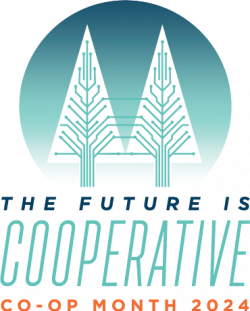What it Means to be a Part of a Co-op
October 2, 2024 4:16 am October is National Co-op Month, a month dedicated to raising awareness around these unique establishments that offer a trusted, proven way to do business and build communities.
October is National Co-op Month, a month dedicated to raising awareness around these unique establishments that offer a trusted, proven way to do business and build communities.
You have likely heard of a co-op, but do you really know what it means? From community-minded decision-making to better overall rates — being a part of a co-op network has many benefits.
What even is a co-op?
The International Cooperative Alliance defines a co-op (or cooperative) as “an autonomous association of persons united voluntarily to meet their common economic, social, and cultural needs and aspirations through a jointly owned and democratically controlled enterprise.”
In other words, a co-op buys or sells products or services, but unlike other businesses, they are owned by their members and don’t have to answer to outside stockholders. They can focus on the communities they serve and make decisions based on people rather than profit.
Just like no person is the same, no co-op is either. There are worker co-ops (owned by their employees) and consumer co-ops. Credit unions are financial service co-ops that act as consumer cooperatives. These financial co-ops help strengthen the local economy and give their members, who actually own the place, the ability to make strategic decisions about the financial institution’s future as well as share in the profits.
Now that we have that covered, let’s dive into some common benefits of joining a financial co-op, AKA a credit union.
Membership is ownership
You’re not just a “customer” at your credit union; you’re a “member”
What’s the difference? As a member, you not only get to use your credit union’s services, but you also get a say in how your credit union operates. Like all co-ops, credit unions are governed by a board of directors that are elected from the membership by the membership. One member equals one vote and everyone has an equal opportunity to participate in setting policies and making decisions. You can shape your credit union’s future by getting involved.
Member and Community-focused
One of the unique perks of co-ops is that they are not-for-profit, meaning that they are created to serve their members, not outside investors. Since they are not focused on earning money for their stockholders (like for-profit financial institutions), credit unions can reinvest any profits they make back into their members and the communities they serve.
When it comes to members, this might mean lower rates on loans and higher rates on savings. But it might also mean more affordable fees and having access to free financial counseling or the option of skipping a payment without penalty.
When it comes to their communities, credit unions are all about service. From organizing volunteer efforts and donating funds back into the community, to providing education and training opportunities for the people within their service area – credit unions find unique ways to support community organizations and make an impact locally.
Welcome to one and all
Co-ops are for all people willing to accept the responsibilities and benefits of membership. No matter your race, gender, income, religion, or political view – you are welcome at your local credit union.
Due to their inclusive, not-for-profit nature and hyper-local approach, credit unions can meet the needs of people in rural, underserved communities, many of whom may not have had access to a financial institution otherwise. Credit unions are creating opportunities for everyone to reach their financial goals.
More access points
A common myth surrounding credit unions is that accessing your money is harder to do, especially if you move. Credit unions might be local, but their reach is long. Since cooperatives believe in cooperating, most credit union members can access their accounts in person through various ways from just about ANYWHERE. Here are a couple of examples:
- ATM Connections: Many credit unions are connected to a nationwide ATM network that provides surcharge-free ATM access within all 50 states and even 10 countries! With nearly 30,000 ATMs, it’s larger than the ATM networks of BofA, Chase, and Wells Fargo. So, if your mobile banking service isn’t cutting it while on vacation and you need access to cash, your credit union’s co-op has you covered.
- Shared Branching: Shared branching alleviates the burden of only being able to perform transactions at your specific credit union. Through the CO-OP shared branching network, participating credit unions can service members at many locations, even when they move or travel — no matter if the credit union name matches the one on your account!
As you can tell, being a part of a co-op network can have many different benefits, but at its core, these networks are in place to uphold the value of “people over profit.” Their purpose is to give the people who live, work, and recreate in these communities a say in how their financial (and other) institutions service their community.



Comments are closed here.